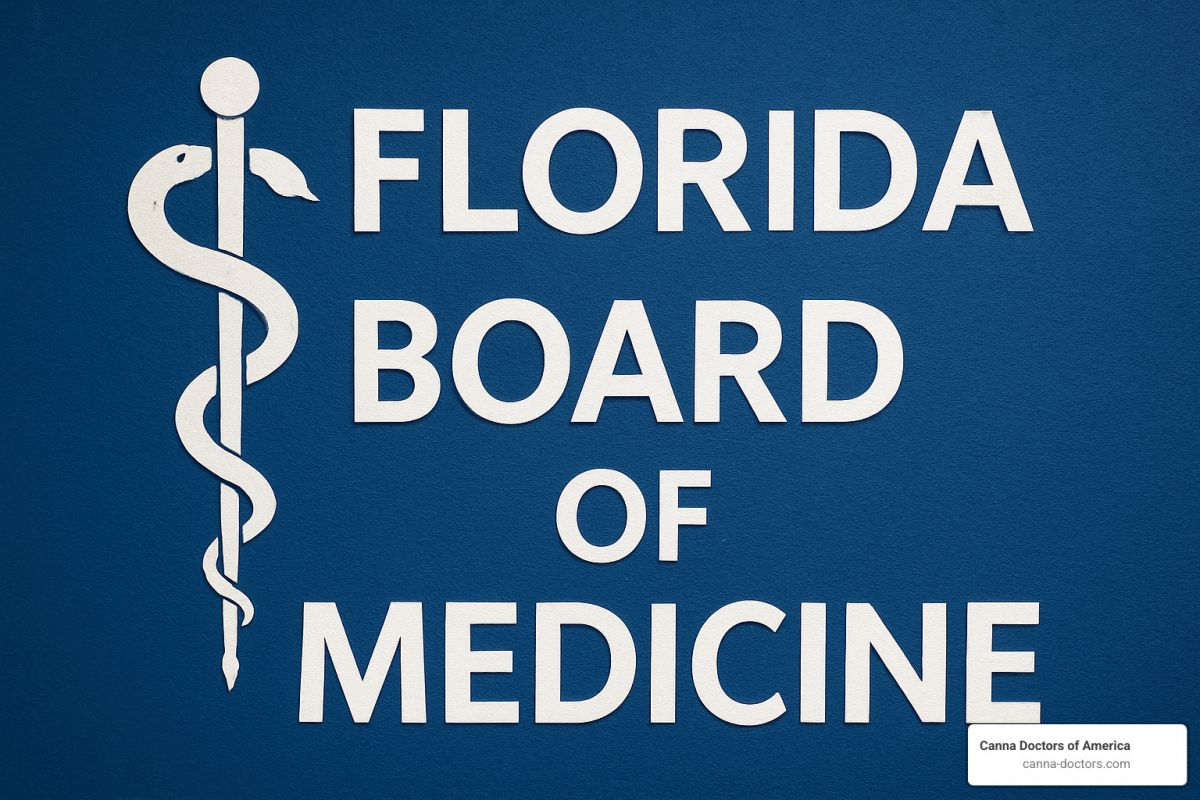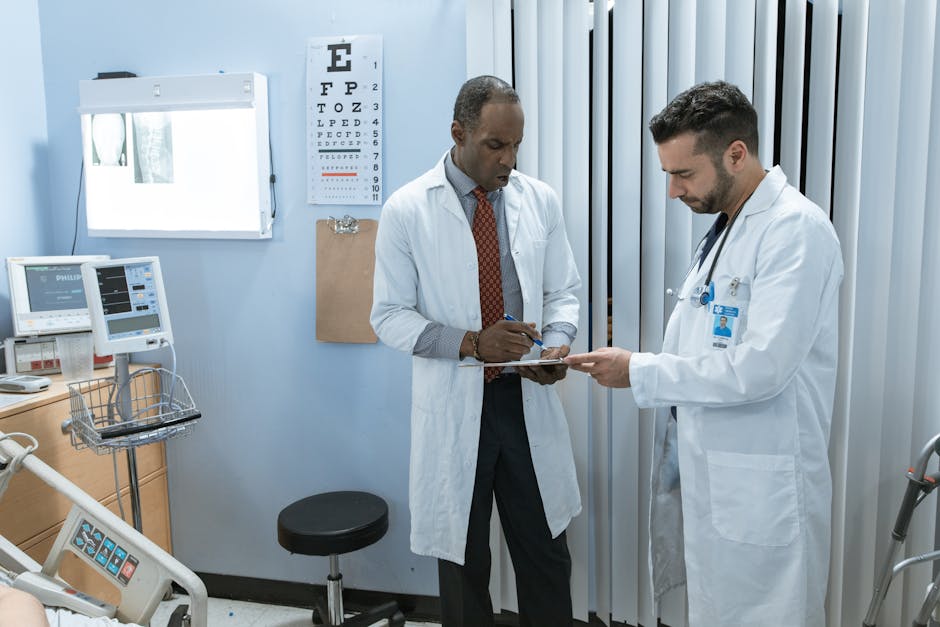Unlocking Your Medical Career with the Florida Board of Medicine

Navigating Your Path to Medical Licensure in Florida
The Florida Board of Medicine is the state regulatory body responsible for licensing and overseeing medical doctors, physician assistants, and anesthesiologist assistants practicing in Florida. For medical professionals looking to practice in the Sunshine State, understanding this board is essential.
Quick Overview: Florida Board of Medicine
- Purpose: Regulates medical practice in Florida to protect public health
- Structure: 7 members (5 physicians, 2 consumer members)
- Key Functions: Issues licenses, enforces standards, investigates complaints
- Application Timeline: Initial review within 30 days by law
- Renewal: Licenses must be renewed biennially
- Online Services: Apply, renew, verify licenses, and file complaints
The Florida Board of Medicine plays a critical role in maintaining high standards of medical care throughout the state. The board meets bimonthly to address disciplinary cases, licensure approvals, and policy discussions that affect all medical practitioners in Florida.
For physicians seeking licensure, the process involves several steps including application submission, background screening, and verification of credentials. The board is fully funded by fees paid by its licensees and supported by professional staff based in Tallahassee.
I’m Geoff Massey, Regional Director of Canna Doctors of America, and my extensive work with patients navigating the Florida Board of Medicine regulations has given me unique insights into helping medical professionals understand these important licensure processes.
Terms related to florida board of medicine:
– Florida MMJ card online
– is weed legal in florida
– same day marijuana card
Understanding the Florida Board of Medicine
When you think about who keeps Florida’s medical practice safe and ethical, it’s the Florida Board of Medicine that’s working behind the scenes. Operating under Chapter 458 of the Florida Statutes, this vital group serves as the watchdog for medical practice throughout the Sunshine State, making sure doctors and medical professionals deliver care that’s safe and effective.
Here’s something interesting – the board doesn’t use a penny of your tax dollars. It’s completely self-funded through fees paid by the medical professionals it oversees. This reflects an important principle that’s worth remembering: practicing medicine in Florida isn’t considered a right that anyone can claim, but rather a privilege that the state grants to qualified individuals.
As part of the Florida Department of Health, the board walks a careful line – protecting patients while also respecting doctors’ professional judgment. It’s this balance that helps maintain high standards while still allowing for healthcare innovation.
What the Board Does & Why It Exists
At its heart, the Florida Board of Medicine exists for one primary purpose: to protect you, me, and everyone who calls Florida home. They do this by ensuring only qualified professionals practice medicine in our state.
The board’s work touches every aspect of medical practice. They evaluate applications and issue licenses to make sure doctors meet Florida’s standards. They set and enforce practice guidelines so you know what to expect from your healthcare. When things go wrong, they investigate complaints and take disciplinary action when needed. And they’re constantly developing policies that put state laws into practical action.
But they’re more than just regulators with clipboards. The board actively works to improve healthcare by promoting best practices and tackling new challenges in medicine. Their regular meetings and public workshops create space for addressing issues facing Florida’s medical community.
Who Sits on the Board and How They’re Chosen
The Florida Board of Medicine brings together diverse perspectives through its seven members. Five are licensed physicians who’ve been practicing for at least four years – they bring the medical expertise. Two are consumer members who have never been licensed healthcare practitioners – they represent the public’s interests.
The Governor appoints these members, and the Senate confirms them. They typically serve two four-year terms, though they might stay longer until replaced or reappointed (with a maximum of ten years of service under Section 458.103, Florida Statutes).
This mix of medical knowledge and public perspective helps ensure balanced decisions. Behind the scenes, professional staff based in Tallahassee handle day-to-day operations and implement the board’s policies.
As one former board member shared, “Board members take their responsibility to protect the public while supporting the medical profession very seriously. The bimonthly meetings involve careful consideration of complex cases and evolving healthcare needs.”
Professions & Facilities Under Board Oversight
The Florida Board of Medicine doesn’t just oversee doctors – its regulatory umbrella covers several professions and facilities:
Medical Doctors (MDs) with allopathic medical degrees form the largest group under supervision. Physician Assistants (PAs) who practice under physician supervision are also regulated by the board, as are Anesthesiologist Assistants (AAs) who work specifically under anesthesiologists.
Beyond individual practitioners, the board oversees Office Surgery Registrations for facilities performing certain levels of procedures and Pain Management Clinics primarily engaged in treating pain.
This comprehensive oversight covers everything from initial licensing to renewals, continuing education requirements, and disciplinary actions when standards aren’t met. By regulating both practitioners and their facilities, the board creates a thorough framework that protects patients at every level of care.
Licensing Pathways & Requirements with the Florida Board of Medicine
Getting licensed by the Florida Board of Medicine doesn’t follow a one-size-fits-all approach. Instead, the board offers several pathways designed to accommodate your unique background while ensuring you meet Florida’s high standards of medical practice.
Primary Licensure Pathways
If you’re fresh out of medical school, the licensure by examination route is likely your path forward. This option is perfect for recent graduates who’ve successfully passed their USMLE or COMLEX exams and are ready to begin practicing.
Already licensed in another state? The licensure by endorsement pathway might save you significant time and paperwork. This option recognizes your existing credentials and experience, streamlining your entry into Florida’s medical community.
Good news for physicians planning ahead for 2024 and beyond! Florida recently became the 40th state to join the Interstate Medical Licensure Compact (IMLC). Starting Fall 2024, this expedited pathway will make it much easier for qualified doctors to practice across state lines if you’re already licensed in another compact state.
Key Requirements Across All Pathways
No matter which path you choose, certain requirements remain consistent. You’ll need to complete a background screening with fingerprinting – Florida takes patient safety seriously! You’ll also contribute to the Neurological Injury Compensation Association (NICA), which provides benefits to families of infants with certain birth-related neurological injuries.
Don’t forget about financial responsibility requirements. You’ll need to show proof of malpractice coverage or formally claim an exemption. Many applicants also use the Federation Credentials Verification Service (FCVS) to streamline the verification process, which can save considerable time and hassle.
“The most common delay I see is incomplete documentation,” shares a board representative. “Physicians who submit complete packets typically move through the process much more quickly.”
Step-by-Step Initial Application Checklist
Ready to apply? The Florida Board of Medicine has made things easier with their online portal, but attention to detail remains crucial. Start by creating an account on the MQA Online Services Portal, then select your profession and application type. The online application will ask for both personal and professional information – have your details ready!
You’ll need to submit fingerprints through an FDLE-approved Livescan provider and gather supporting documents like medical school transcripts, residency certificates, exam scores, and current license verifications. After paying your application and licensure fees, you can monitor your status online.
Florida law requires initial review within 30 days of submission. If anything’s missing, you’ll receive a deficiency letter requesting additional information. Stay on top of these communications to avoid delays!
Special Licenses & Certificates
The Florida Board of Medicine understands that one standard license doesn’t fit all practice situations. If you’re over 65 or have specific practice restrictions, a limited license might be appropriate. Full-time faculty at Florida medical schools can apply for a medical faculty certificate.
Military personnel benefit from temporary certificates for active duty military and veterans, offering an expedited pathway to practice. If you’re passionate about serving underserved communities, look into the temporary certificate for practice in areas of critical need.
Public health physicians employed by the Department of Health can obtain a public health certificate, while out-of-state physicians providing telehealth services to Florida patients should consider the telehealth provider registration (though note that telehealth providers face restrictions on prescribing controlled substances to Florida patients).
Financial Responsibility, CME & Practitioner Profile
Once licensed, your relationship with the Florida Board of Medicine continues. You’ll need to maintain medical malpractice coverage (minimum $100,000/$300,000) or meet exemption criteria to fulfill your financial responsibility requirements.
Your education doesn’t stop at licensure – plan to complete 40 hours of continuing medical education every two years, including required topics that keep you current on Florida’s medical priorities and regulations.
Don’t overlook your practitioner profile – this public-facing information must be updated within 15 days of any changes. It’s often the first place patients look when researching potential doctors, so accuracy matters!
At Canna Doctors of America, we work closely with physicians navigating these requirements, especially those interested in incorporating medical cannabis into their practice. Understanding the Florida Board of Medicine requirements is just the first step in providing comprehensive care to Florida patients.
Renewal, Monitoring & Status Changes
Once you’ve earned your license through the Florida Board of Medicine, you’ll enter a biennial (every two years) renewal cycle. Since mid-2023, Florida has gone fully digital with e-licensing – no more paper licenses to worry about losing! Now everything happens online, making the process more streamlined for busy medical professionals.
How to Renew on Time and Avoid Penalties
Renewing your medical license in Florida doesn’t have to be stressful. The Florida Board of Medicine has created a straightforward process that begins about 90 days before your expiration date when you’ll receive a friendly reminder email.
The renewal process is simple: log into the MQA Online Services Portal, complete your renewal application (including confirming you’ve completed your required continuing education), and pay your renewal fee – typically $355 for medical doctors. Once complete, you can instantly verify your renewal status through the license verification tool.
Missing your renewal deadline isn’t just an inconvenience – it means you legally cannot practice medicine until you restore your license. Plus, practicing with an expired license can lead to disciplinary headaches including fines and formal reprimands. As one Florida physician told me, “The e-licensing system has made renewal so much easier, but I still put my renewal date in my calendar with multiple reminders. It’s just not worth the risk of forgetting.”
Reactivate, Retire, Relinquish or Change Your License
Life changes, and sometimes your license status needs to change too. The Florida Board of Medicine offers several options to accommodate different career phases:
If you need to reactivate an inactive or retired license, you’ll submit a written request to BOM_PostLicensure@flhealth.gov along with proof of completed CME for each year you were inactive, applicable fees, and completed Health History and Financial Responsibility forms. Been inactive for more than two of the last four years? Be prepared to meet with the Credentials Committee and possibly take the SPEX exam.
Wanting to go inactive? Simply log into the portal, select “Request Inactive Status,” and pay reduced renewal fees. Just remember – you cannot practice medicine while inactive.
Ready to retire? The process is similar to going inactive, but retired licenses don’t require renewal. The upside is no more fees; the downside is you’ll stop receiving important notifications and will need to catch up on back fees and CE credits if you ever want to practice again.
If you’re leaving the profession entirely, you can voluntarily relinquish your license by emailing BOM_PostLicensure@flhealth.gov. This is straightforward if you’re not under investigation. If you are under investigation, you’ll need to apply for a Board-approved voluntary relinquishment.
Got married or moved? Name and address changes must be updated within 15 days through the portal. For name changes, you’ll need to submit legal documentation.
Continuous Oversight: Audits & Compliance
The Florida Board of Medicine doesn’t just issue licenses and disappear – they maintain ongoing oversight to ensure all practitioners maintain professional standards.
Be prepared for random CME audits where you’ll need to provide documentation of all those continuing education hours you’ve claimed. This is why keeping records of your CME activities is so important!
Your financial responsibility requirements also remain under monitoring, so keep that malpractice coverage documentation (or exemption proof) for at least seven years.
If you’re serving in underserved communities, the FRAME Program might be worth exploring – participants can receive up to $20,000 annually for their service.
And for practitioners facing substance use or mental health challenges, the Professionals Resource Network offers confidential support. This compassionate program recognizes that doctors are human too and sometimes need help themselves.
Consumer Protection, Complaints & Discipline
The Florida Board of Medicine walks a careful line between supporting medical professionals and protecting Florida residents. This balance shines through in their thoughtful systems for investigating complaints and taking disciplinary action when needed.
How the Public Can Verify a Practitioner
Before scheduling that first appointment, patients can (and should!) check their doctor’s credentials using the Verify a License tool on the Florida Department of Health website. This user-friendly search reveals:
- Current license status (active, expired, or restricted)
- When the license was issued and when it expires
- Any disciplinary history the public should know about
- Where the doctor practices
- Educational background and training
“We always encourage patients to verify their physician’s credentials,” says a board spokesperson. “This simple step can provide peace of mind and ensure you’re receiving care from a properly licensed professional.”
When checking a doctor’s background, keep an eye out for concerning signs like expired licenses, multiple disciplinary actions, practice restrictions, or specialty claims that don’t match their training. A quick verification can save headaches down the road!
Filing a Complaint: What to Expect
If you’ve experienced care that seems below standard, you have the right to File a Complaint with the Florida Board of Medicine. The process is designed to be thorough yet fair to all parties:
First, you’ll submit details through the online complaint portal, describing what happened and why you believe standards weren’t met. Department staff then review your complaint to make sure it falls within their authority to address. If it does, an investigator steps in to gather evidence – including medical records, witness statements, and other relevant information.
For cases involving the quality of medical care, board-certified physicians review the details to provide expert opinions. A probable cause panel (a small group of board members) then examines all the evidence to decide if formal charges are warranted.
The timeline varies based on complexity – a straightforward case might resolve in a few months, while more complicated situations can take longer. Throughout the process, both patient and physician rights are carefully considered.
Board Disciplinary Actions Explained
When the Florida Board of Medicine finds violations, they have several options, depending on the seriousness of the issue:
For minor violations, the board might issue a letter of concern, require additional education, or impose a modest fine (typically $1,000-$10,000). These actions aim to correct problems before they become serious.
Moderate violations might result in a formal reprimand, probation with specific conditions, practice restrictions, or larger financial penalties. These measures provide stronger oversight while allowing the physician to continue practicing.
In cases of severe violations that threaten patient safety, the board can suspend or revoke a license or permanently prohibit certain types of practice. These serious actions are only taken after careful deliberation and clear evidence of significant problems.
“The board’s disciplinary process is designed to be remedial rather than punitive whenever possible,” explains a former board member. “The goal is to protect the public while helping physicians address deficiencies and return to safe practice when appropriate.”
All final disciplinary decisions become part of the public record and appear permanently on the practitioner’s profile. This transparency ensures patients can make informed choices about their healthcare providers – a cornerstone of the Florida Board of Medicine’s commitment to public safety.
Staying Connected: Resources & Professional Involvement
Building a real relationship with the Florida Board of Medicine does more than just keep you compliant—it can improve your career and give you a voice in shaping medical practice in Florida. Think of the board not just as a regulatory body, but as a professional partner throughout your medical career.
Key Statutes, Rules & Updates
The legal framework that governs medical practice in Florida might seem overwhelming, but staying informed is easier than you might think.
Chapter 456, Florida Statutes lays out the general provisions for all healthcare practitioners, while Chapter 458, Florida Statutes (the Medical Practice Act) specifically addresses physician practice. The detailed implementation rules appear in Rule 64B8 of the Florida Administrative Code.
“I make it a habit to check the board’s legislative alerts quarterly,” shares Dr. Maria Sanchez, a family physician in St. Petersburg. “It’s helped me stay ahead of changes that affect my practice before they catch me by surprise.”
You can subscribe to receive email updates directly from the board whenever new information is posted—a simple step that can save you hours of research time and potential compliance headaches.
Additional Tools & Help Centers
The Florida Board of Medicine offers a variety of practical resources that make navigating licensure and compliance much easier:
The Help Center on the board’s website answers the most common questions physicians have, from renewal procedures to scope of practice concerns. If you’re struggling with fingerprinting requirements, the Background Screening Portal walks you through each step of the process.
CE Broker takes the guesswork out of tracking your continuing education credits, while the MQA Online Services portal lets you handle most license management tasks from your computer or phone. And if you have a quick question at 11 PM? The ELI Virtual Assistant is available 24/7 to answer common questions instantly.
For physicians interested in incorporating medical cannabis into their practice, we at Canna Doctors of America offer guidance on navigating Florida’s medical marijuana regulations. Learn more about our straightforward process for helping patients access this important treatment option.
Professional Involvement Opportunities
Your relationship with the Florida Board of Medicine doesn’t have to be one-sided. There are meaningful ways to contribute your expertise and perspective:
The Expert Witness Program lets qualified physicians review cases involving standard of care complaints—work that directly impacts how medicine is practiced in Florida. If you’re passionate about healthcare access, the Volunteer Healthcare Provider Program provides opportunities to serve underserved communities while receiving sovereign immunity protection.
Board Rule Workshops and Public Meetings are open to all physicians, giving you a voice in shaping the regulations that govern your practice. These meetings—once formal affairs held only in Tallahassee—now often include virtual participation options, making them accessible to busy practitioners statewide.
“Attending my first board meeting was eye-opening,” recalls Dr. James Thompson of Clearwater. “I realized these weren’t abstract rules being created in a vacuum, but thoughtful discussions by people who understand the real-world implications for both doctors and patients.”
The FRAME Program (Florida Reimbursement Assistance for Medical Education) offers substantial financial benefits—up to $20,000 annually—for physicians willing to serve in areas of critical need, making it both a meaningful service opportunity and a practical way to address educational debt.
By actively engaging with these resources and opportunities, you transform your relationship with the Florida Board of Medicine from a simple regulatory requirement into a valuable professional partnership.
Frequently Asked Questions about the Florida Board of Medicine
How long does it take to get a Florida medical license?
Getting your Florida Board of Medicine license is a bit like waiting for a good Florida sunset – the timing varies, but the result is worth it.
Most physicians wonder about the timeline, and it’s one of our most common questions. While each application is unique, there are some general timeframes to keep in mind:
By law, the board must review your application within 30 days of submission – that’s your first milestone. If your application is complete with all documentation in perfect order, you’re looking at about 2-3 months from submission to having that license in hand.
However, if there are missing documents or information (which happens more often than you might think), the process typically stretches to 4-6 months. And if your application involves disciplinary history, health concerns, or criminal background issues, expect additional time for the board to complete a thorough review.
“The key to a smooth application process is submitting complete documentation initially,” shared a licensing specialist I spoke with recently. “Responding promptly to any deficiency notices also significantly reduces processing time.”
To keep your application moving as efficiently as possible, consider using FCVS for credential verification, ensure all supporting documents come directly from the source, and check your application status regularly. Most importantly, respond to any deficiency notices within 21 days – this simple step can save you weeks of waiting.
Can I track my application status online?
Yes! The Florida Board of Medicine has made tracking your application status refreshingly straightforward through their online portal.
The process is simple: visit the MQA Online Services Portal, log in with your credentials, select “Check Application Status,” and you’ll see exactly where things stand. The tracker shows you when your application was received, what processing stage it’s currently in, any outstanding requirements, and even provides contact information for your assigned processor.
This transparency eliminates the mystery of where your application stands. If there are any deficiencies (items you still need to submit), you’ll see them clearly listed on the tracker. You’ll also receive formal notification by email or mail with specific instructions for submitting what’s missing.
I’ve found that checking the status weekly during the application process helps keep things moving and allows you to address any issues promptly.
What happens if I practice with an expired license?
Practicing medicine with an expired license in Florida is something to avoid at all costs – it’s considered unlicensed practice and carries serious consequences.
The Florida Board of Medicine takes this violation seriously, and the penalties can be substantial. You could face administrative fines up to $10,000 per violation, formal disciplinary action ranging from a reprimand to probation or worse, and in repeated cases, even criminal charges might be on the table. Perhaps most damaging long-term is the permanent public disciplinary record that follows your professional reputation.
When evaluating these cases, the board typically considers factors such as how long you practiced with the expired license, whether you were aware of the expiration, if any patients were harmed, and your prior disciplinary history.
“Even a brief period of practice with an expired license can result in significant consequences,” a board representative explained during a recent meeting. “The best approach is to set calendar reminders several months before expiration and verify renewal completion through the license lookup tool.”
At Canna Doctors of America, we’ve seen how important maintaining proper licensure is for all medical professionals. That’s why we recommend setting multiple reminders – one at 90 days before expiration, another at 60 days, and a final alert at 30 days. This simple system helps ensure you never find yourself in this uncomfortable situation.
Renewing on time is much easier than dealing with the aftermath of practicing with an expired license. When in doubt, you can always verify your current license status through the board’s online verification tool.
Conclusion
Navigating medical licensure in Florida can feel like a complex journey, but the Florida Board of Medicine serves as both your guide and guardian along the way. As we’ve explored throughout this guide, the board plays a crucial dual role – opening doors for qualified medical professionals while protecting the public through careful oversight.
For physicians at any stage of their career, success with the Florida Board of Medicine comes down to a few essential practices. First, plan ahead with your applications – gathering documentation early saves significant headaches later. The board’s 30-day initial review timeline is just the beginning of a process that requires patience and attention to detail.
Staying informed about regulatory changes is equally important. Medicine evolves, and so do the rules governing its practice. Taking time to review updates from the board can help you avoid unintentional violations that might jeopardize your license.
Perhaps most crucial is maintaining compliance with renewal deadlines and continuing education requirements. As we discussed earlier, practicing with an expired license – even briefly – can lead to serious consequences that follow your career for years.
“The most successful physicians see the board as a partner rather than an obstacle,” notes a longtime Florida practitioner. “When you engage proactively with board resources before problems arise, you’re much more likely to maintain a smooth professional journey.”
Beyond basic compliance, consider ways to get involved with the profession at a deeper level. Whether serving as an expert witness or participating in rule workshops, your contributions strengthen healthcare across the Sunshine State.
At Canna Doctors of America, we work daily with patients navigating the intersection of traditional medicine and medical cannabis treatment. Our team understands the importance of maintaining full compliance with Florida Board of Medicine standards while helping patients access the care they need in Tampa, St. Petersburg, and Clearwater.
For qualifying patients, we offer same-day approval for medical marijuana cards, making the process as seamless as possible. Our physicians stay current on both standard medical licensure requirements and the specialized regulations governing medical cannabis recommendations.
If you’re interested in learning more about medical marijuana treatment options in the Tampa area, our Tampa marijuana cards page provides comprehensive information about the process and benefits.
The path to medical practice in Florida may have its challenges, but with the right information and support, it becomes a manageable journey toward a rewarding career. Whether you’re just starting out or looking to maintain your established practice, understanding the Florida Board of Medicine is your foundation for professional success while serving Florida’s diverse communities.











